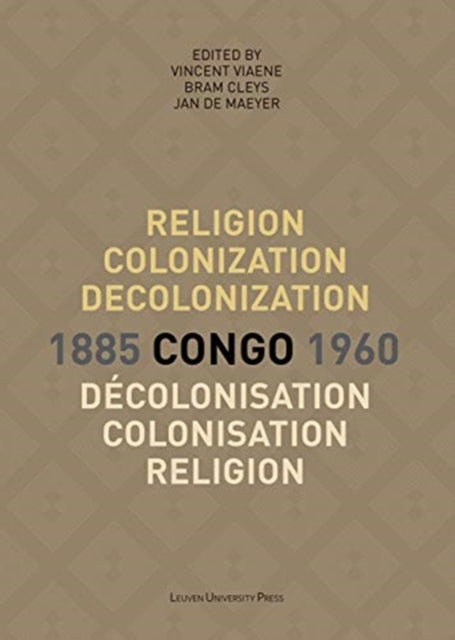Shulph Ink
Religion, colonization and decolonization in Congo, 1885-1960. Religion, colonisation et decolonisation au Congo
Religion, colonization and decolonization in Congo, 1885-1960. Religion, colonisation et decolonisation au Congo
YOU SAVE £2.11
- Condition: Brand new
- UK Delivery times: Usually arrives within 2 - 3 working days
- UK Shipping: Fee starts at £2.39. Subject to product weight & dimension
Bulk ordering. Want 15 or more copies? Get a personalised quote and bigger discounts. Learn more about bulk orders.
Couldn't load pickup availability
- More about Religion, colonization and decolonization in Congo, 1885-1960. Religion, colonisation et decolonisation au Congo
Religion in the Democratic Republic of Congo is diverse and complex, with many different faiths and practices. During the colonial period, religion was also central to people's lives, and faith and worship were marked by diversity and dynamism. This book explores the multifaceted history of the interaction between religion and colonization, including the institutional political framework, the complex interaction between indigenous and imported non-African religious beliefs and practices, and the role of religions in the independence movement and their reaction to independence.
Format: Paperback / softback
Length: 336 pages
Publication date: 22 October 2020
Publisher: Leuven University Press
The Democratic Republic of Congo is a vibrant tapestry of religious diversity, with a multitude of faiths and practices coexisting harmoniously within its borders. From the bustling seminaries and Marian shrines of the Catholic Church to the Islamic brotherhoods and Jewish community of Lubumbashi, the country boasts a rich tapestry of religious expression. Moreover, the African churches of the Congolese diaspora in cities like Brussels and Paris, the healers of Kimbanguism, the televangelism of the thriving Pentecostalist churches in the metropolis, the Orthodox communities of Kasai, and the enigmatic Mai Mai warriors in the dense forests of Kivu all contribute to the diverse religious landscape of the Congo.
While religion has always played a significant role in the lives of the Congolese people, its significance has only grown in the post-colonial era. During the colonial period, religion was not only a source of solace and comfort for the colonized but also a tool for resistance and empowerment. Missionaries, who were often linked closely to imperial power, brought with them their own religious beliefs and practices, which intermingled with the indigenous beliefs and customs of the Congolese people. This complex interaction resulted in a rich and dynamic religious landscape that continues to shape the country today.
In this book, a team of esteemed scholars and researchers delve into the multifaceted history of the interaction between religion and colonization in the Congo. They examine the institutional political framework that governed religious practices during the colonial period, exploring the complex interplay between indigenous and imported non-African religious beliefs and practices. The authors also highlight the role that religions played in the independence movement and their response to independence itself.
Contributors to this book come from various fields, including history, anthropology, and religious studies. They bring a wealth of expertise and perspectives to the table, providing insights into the historical, cultural, and social dimensions of the interaction between religion and colonization in the Congo.
One of the key themes that emerge from the contributions in this book is the role of religion in shaping the identity and culture of the Congolese people. Religion has been used as a tool for resistance and empowerment, providing a sense of community and belonging for the marginalized and oppressed. It has also played a significant role in the country's political and social movements, with religious leaders and organizations often serving as vocal advocates for social justice and human rights.
Another important theme is the impact of colonialism on indigenous religious practices and beliefs. Many indigenous religious traditions were suppressed or marginalized during the colonial period, as missionaries sought to convert the Congolese people to their own religious beliefs and practices. However, some indigenous religious practices have survived and continue to thrive, providing a sense of continuity and identity for the Congolese people.
The contributions in this book also shed light on the complex relationship between religion and power. The colonial government used religion as a tool to control and manipulate the Congolese people, using religious institutions and leaders to promote their own agenda and suppress dissent. However, religious organizations and leaders also played a role in resisting colonialism, using their moral authority and spiritual power to challenge the colonial order.
In conclusion, the Democratic Republic of Congo is a testament to the resilience and diversity of religious expression. From the bustling seminaries and Marian shrines to the enigmatic Mai Mai warriors, the country's religious landscape is a reflection of the rich and complex history of the interaction between religion and colonization. This book provides valuable insights into the multifaceted history of the interaction between religion and colonization in the Congo, shedding light on the role that religion played in shaping the country's identity and culture, as well as the complex relationship between religion and power.
Weight: 682g
Dimension: 170 x 237 x 25 (mm)
ISBN-13: 9789462701427
This item can be found in:
UK and International shipping information
UK and International shipping information
UK Delivery and returns information:
- Delivery within 2 - 3 days when ordering in the UK.
- Shipping fee for UK customers from £2.39. Fully tracked shipping service available.
- Returns policy: Return within 30 days of receipt for full refund.
International deliveries:
Shulph Ink now ships to Australia, Belgium, Canada, France, Germany, Ireland, Italy, India, Luxembourg Saudi Arabia, Singapore, Spain, Netherlands, New Zealand, United Arab Emirates, United States of America.
- Delivery times: within 5 - 10 days for international orders.
- Shipping fee: charges vary for overseas orders. Only tracked services are available for most international orders. Some countries have untracked shipping options.
- Customs charges: If ordering to addresses outside the United Kingdom, you may or may not incur additional customs and duties fees during local delivery.


